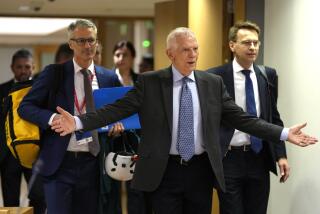IMF Putting Russian Aid on Fast Track : Economics: A ‘down-payment’ loan of $1 billion is designed to bolster Yeltsin’s commitment to reform.
- Share via
WASHINGTON — The International Monetary Fund, putting aid for Russia on an unusual fast track, plans to release a “down payment” loan of $1 billion to the government of President Boris N. Yeltsin as soon as the fund approves his economic reform program, U.S. and Russian officials said Wednesday.
The early financing, which could be approved as early as next week, is intended to bolster Yeltsin’s commitment to economic reform and to give the people of Russia a sense that significant Western aid is on the way, the officials said.
President Bush and other allied leaders want to announce the loan by the time they meet Yeltsin at the annual summit of major economic powers in Munich next month--so the Russian leader can reap some political benefit, one U.S. official said.
The loan will be the first major installment of a $24-billion multinational aid package that Bush and other Western leaders promised almost three months ago.
“This is real money,” a senior U.S. official said. “It’s intended to serve as a bridge to a more complete aid program that will kick in as their reforms progress.”
“It will bring hope, and it is a breakthrough,” said one of the Russian economists working on Yeltsin’s effort to transform a state-run economy to a Western-style free market.
The Russians and the IMF have been negotiating for months over the terms of Yeltsin’s reform program. The Russians want early loans to help soften the effect of economic disruption, while the fund’s flinty-eyed economists demand more reforms.
But in recent weeks, the United States, Germany and Britain have all signaled that they believe Yeltsin deserves to receive at least some of the promised aid--if only to stave off charges from his conservative opponents that his reforms have produced only misery.
“We’re not relaxing any of our standards,” an IMF official insisted. “But we are aware of what our members are saying.”
As a result, the IMF has decided to split its aid into a three-stage plan: first the $1-billion down payment, then the rest of an estimated $4.5-billion support fund and finally an estimated $6-billion fund to support the new, freely convertible Russian ruble.
“Each stage is a different level of conditionality,” a U.S. official said--meaning that each new stage will require Russia to show more progress in its economic reforms.
Russia’s acting prime minister and economic czar, Yegor T. Gaidar, agreed to the three-stage plan last week in two days of talks with IMF Managing Director Michel Camdessus, officials said.
The total $24-billion aid plan includes about $10.5 billion in loans and credits from the IMF and World Bank, about $2.5 billion in postponed interest payments on existing loans and about $11 billion in direct aid, mostly loans, from the United States, Germany and other countries.
But officials said that the IMF share is the most important part--because it is expected to grow in future years and because the fund’s seal of approval on the economic reform plan will encourage other donors to release more funds.
An IMF negotiating team is scheduled to leave Washington for Moscow today to finish talks with the Russians.
Officials said they expect to reach agreement on an interim version of the Yeltsin program. That would allow Camdessus to recommend approval of the $1-billion credit to the IMF’s 22-member executive board.
Russia’s chief negotiator in the talks, Konstantin Kagalovsky, told a meeting of economic officials in Moscow that he hopes that the talks can be completed by the end of next week.
“This agreement is the key to unblocking the $24 billion in Western assistance,” Kagalovsky said.
“This is a crucial moment for us and for our economic reform program,” he said. “We need the IMF’s help and understanding.”
Russian officials said that significant disputes remain, particularly over the amount of credits the Russian Central Bank will provide struggling enterprises, the budget deficit and inflation.
McManus reported from Washington and Parks from Moscow.
More to Read
Sign up for Essential California
The most important California stories and recommendations in your inbox every morning.
You may occasionally receive promotional content from the Los Angeles Times.










